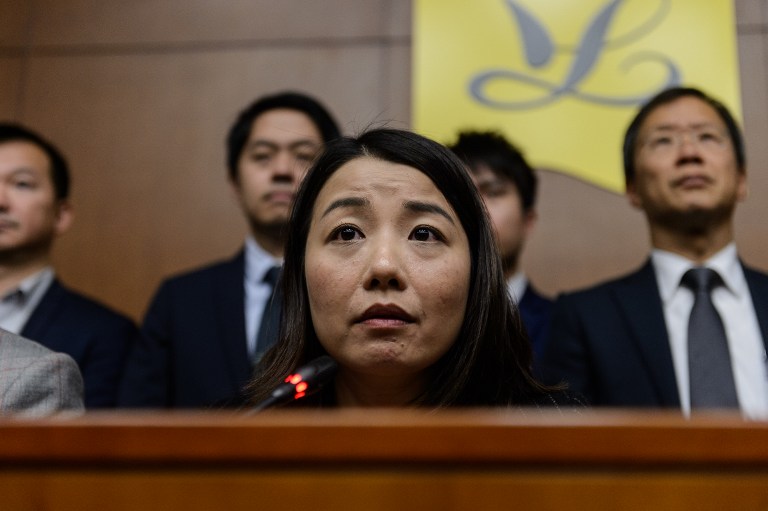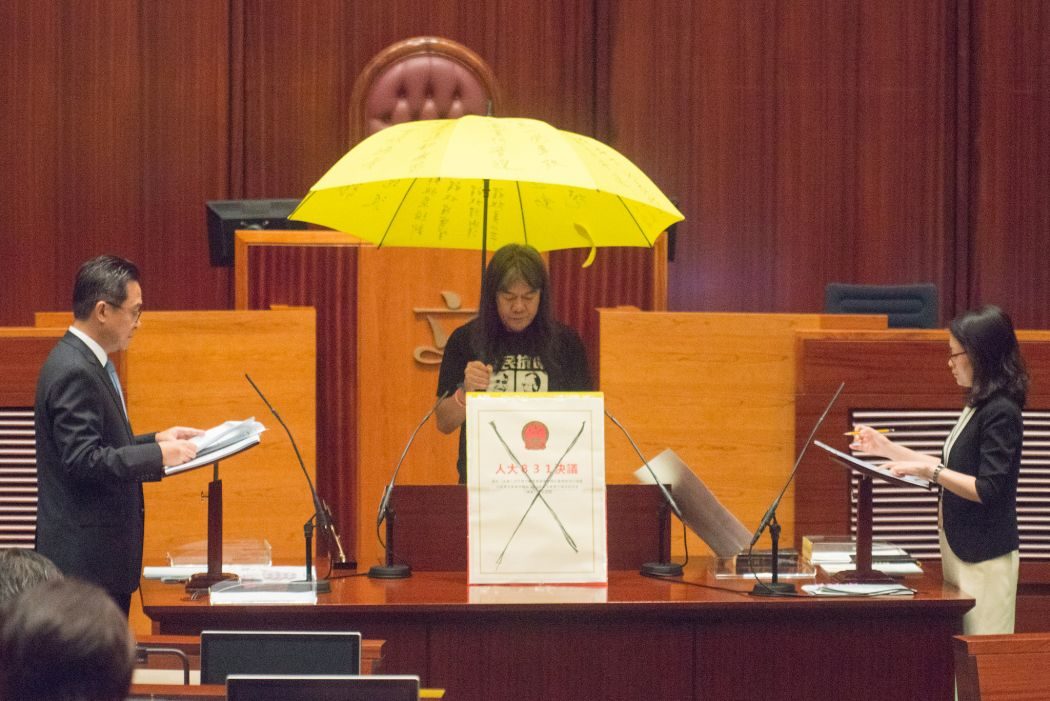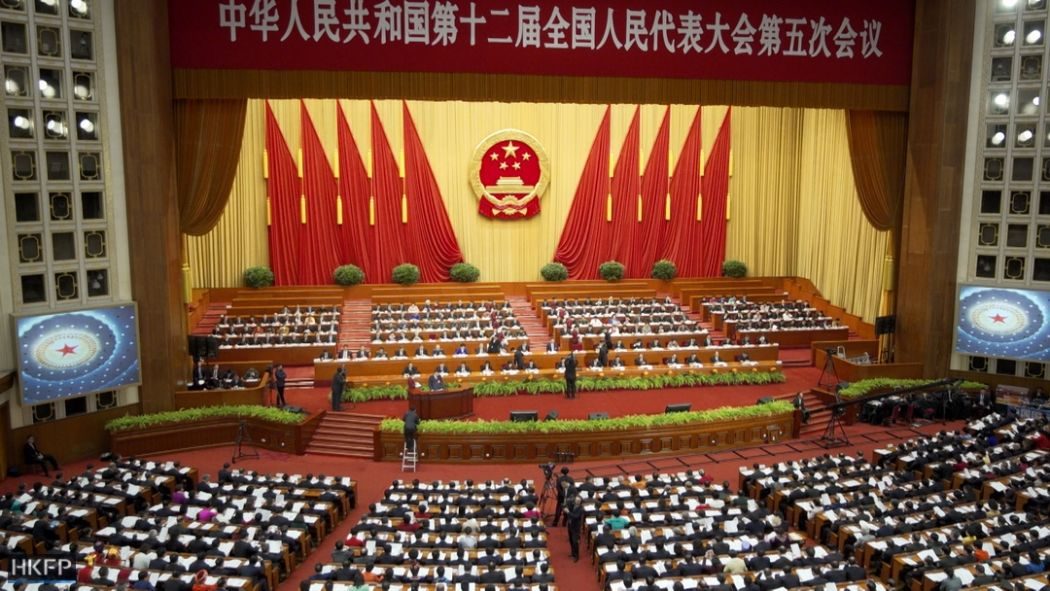Legal experts have raised concerns over Beijing’s interpretation of Hong Kong’s mini-constitution amid the oath row in the legislature, arguing that it damaged Hong Kong’s rule of law and potentially violated human rights.
The remarks came after the Court of First Instance unseated four elected lawmakers last Friday for failing to take their oaths properly at LegCo last October.

Ahead of Friday, elected localists Yau Wai-ching and Baggio Leung had already been ousted as legislators by the High Court following a controversial ruling by China’s top legislature. The Standing Committee of the National People’s Congress (NPCSC) gave detailed guidelines on the requirements for oaths taken by Hong Kong’s public officers.
See also: Explainer & Timeline: The oath fallout and Beijing’s intervention in Hong Kong’s mini-constitution
The ruling sought to interpret Article 104 of the Basic Law – a provision on oath-taking – though legal experts suggested that the decision amounted to an amendment to the city’s mini-constitution.
The argument was rejected in the appeal case of Yau and Leung. The Court of Appeal affirmed that Beijing’s interpretation – despite being handed down after the legal action against the duo had begun – was retroactive from July 1, 1997 and hence applicable to the dispute.
Sincerity requirement
In unseating Yau and Leung, Court of First Instance judge Thomas Au did not rely on the interpretation. Last Friday, however, he frequently referenced the interpretation in his judgement.

Beijing’s interpretation stipulates that an oath must be taken “accurately, completely and solemnly” and in exactly the same “form and content.”
Au rejected arguments made by several senior counsel that oath-taking is a political act or a formality. Referencing Beijing’s interpretation, he said it is a “constitutional legal requirement” for an oath-taker to “sincerely believe” in the pledge.
“These are pledges of utmost constitutional importance and significance,” he said.
In assessing whether the four lawmakers “sincerely” believed in their pledges, Au adopted an objective test. As an example, Au said Nathan Law “objectively express[ed] a doubt on or disrespect of the status of the People’s Republic of China as Hong Kong’s legitimate sovereign country” by raising his tone whenever he read the word “Republic” in the oath.
But the Progressive Lawyers Group’s Siegfried Sin, a researcher of public international law, told HKFP that Au should have taken into account whether the ousted lawmakers had subsequently executed their sworn duties.

“Au can very well limit the time frame to only the moment of oath-taking,” he said.
“But if that’s the case, not only [the LegCo] members’ action but also their minds should be taken into account because that would be the only way of finding out – at the moment of oath taking – what the members believed.”
Human rights concern
In his judgement, Au dismissed a submission by Senior Counsel Martin Lee that the Article 104 oath provision – following the interpretation -violated constitutional rights such as the right to stand in elections. Au said those rights are not absolute and should be “read to be subject to” the provision.
But Sin said Au had it reversed: “Reading it the other way around is the more logical answer. If there was no political participation, there would be no one taking any oath of public office. But the right of political participation in this case has been limited by Article 104.”
Meanwhile, human rights law researchers Geoffrey Yeung and Edward Wong took aim at the strict requirements of oath-taking, which they said may violate the rights to freedom of expression and to stand in elections.
“The International Covenant on Civil and Political Rights, the Hong Kong Bill of Rights Ordinance and the Siracusa Principles all state that national security cannot justify the suppression of political views that do not involve violence or threats to violence,” they wrote in Ming Pao.

They said Hong Kong courts – as the “defender of the constitution” – should be able to independently review every restriction of rights as to whether it is reasonable and proportionate.
But they raised concerns over the lack of this mechanism to keep Beijing’s power in check: “It remains uncertain whether the courts can consider the importance of human rights protections when applying NPCSC interpretations.”
“[I]f there is no constitutional mechanism to scrutinise the interpretations on human rights grounds, the oath row then highlights a significant flaw in our constitution – an issue that goes beyond the question of oath-taking.”
University of Hong Kong law lecturer Eric Cheung told Apple Daily that it is “worth debating” in the appeal over whether Au set the bar of oath-taking too high.
Rule of law
However, lawyer Kevin Yam told HKFP that there is not much Hong Kong courts can do to rein in Beijing’s interpretative power.

He said that whether Au had any political considerations should not be speculated upon. He added that disqualification was “inevitable” as Beijing’s interpretation left little room for the courts to manoeuvre.
“This is not an interpretation but an amendment, but what can you really do about it? Either you challenge that and the court rules that they cannot touch the question, or they question it and then the NPCSC issues an interpretation about the ambit of Article 158 [its interpretative power],” he said.
“The rule of law issue is that we have a mechanism whereby whatever is stated by the NPCSC goes, and that the way [the NPCSC] reach decisions is without any restraint.”
In contrast, Sin believed Hong Kong courts are not completely without a choice.
“The way Hong Kong courts treats NPCSC interpretations these days is questionable, as it is just taking it directly as an interpretation of the law, rather than treating it as a piece of law itself. Such an application defeats the legislative nature of an interpretation,” he said.
He warned that allowing Beijing’s interpretations to have a retroactive effect will lead to legal uncertainty.

‘Unelected judges’
Sin also questioned why Au had been the judge assigned to both judicial review cases against the six ousted lawmakers.
“I am merely suggesting that a judge can single-handedly decide on constitutional affairs, and he is not even elected,” he said.
“Although we should pay the utmost respect to the judiciary as a whole, it is concerning that only one judge can affect the outcome of these affairs without even being questioned or checked.”
The four unseated lawmakers are seeking public donations of HK$5 million, after being ordered to pay the government’s legal bill. They said they may not appeal the court ruling owing to the high financial cost.
The Court of Final Appeal is set to hear an appeal application from Yau and Leung over their disqualification on August 25.
